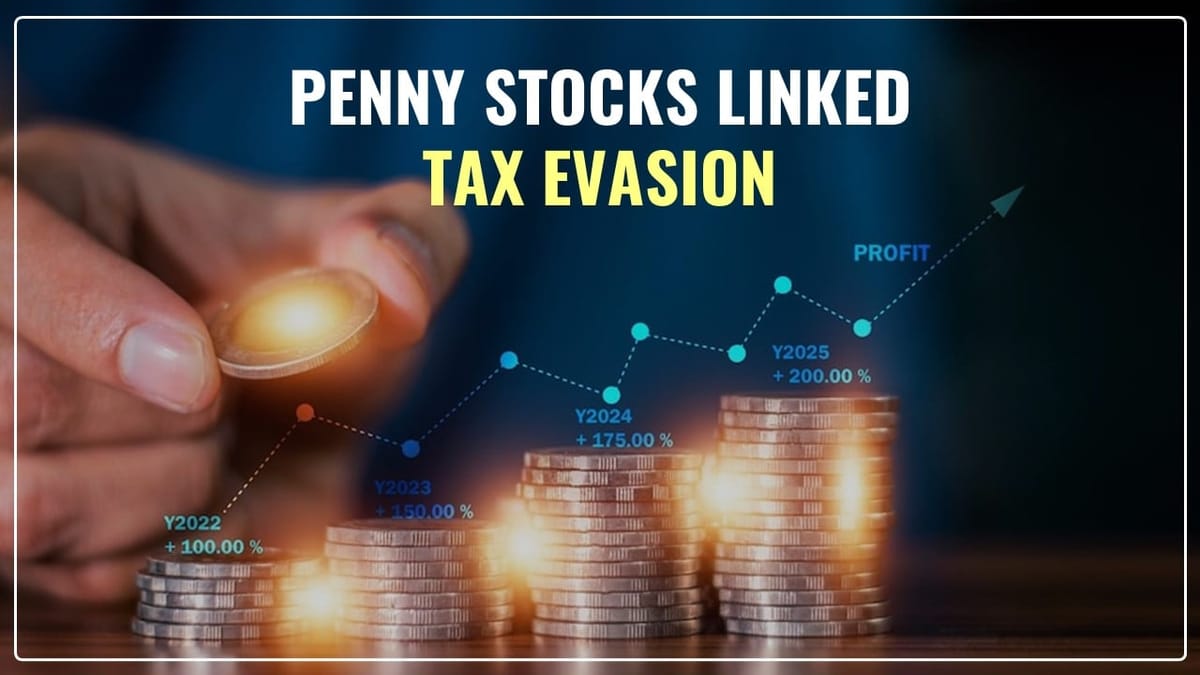The Central Board of Direct Taxes (CBDT) has agreed to broaden the scope of the Income Tax Department's appeal filings in tribunals and courts.
Reetu | Apr 8, 2024 |

Tax Evasion: Penny Stock linked Tax Evasion; Being guilty will take you to Tribunal and Court for Bogus Transactions
The Central Board of Direct Taxes (CBDT) has agreed to broaden the scope of the Income Tax Department’s appeal filings in tribunals and courts.
CBDT has directed, in a circular dated March 15, 2024, that the tax department may now file appeals with income tax tribunals and courts without regard to the tax effect amount in certain defined circumstances based on the merits of the case.
One of the listed examples is penny stocks, which fall under the category of organized tax evasion, including cases of phoney capital gain/loss through penny stocks and accommodation entries.
“Monetary limits given with regard to filing appeal/SLP shall be applicable to all cases including those relating to TDS/TCS under the Act with the following exceptions where the decision to appeal/file SLP shall be taken on merits, without regard to the tax effect and the monetary limits,” said the CBDT in a circular issued on March 15, 2024.
According to tax experts, the CBDT’s goal with this circular is to detect taxpayers who use penny stocks and accommodation entries for tax fraud purposes. The tax authority will not prosecute all persons who invest in penny stocks despite following all tax laws and guidelines, but only those who do so on purpose to evade taxes.
Accommodation entry is a financial transaction between two parties in which one party records the transaction in its books to accommodate the other.
These transactions are typically accommodated in exchange for an equal amount of cash, with an additional commission charged at a specified percentage for offering such accommodation entry. These accommodation entries are used by numerous beneficiaries to introduce unaccounted cash into their books of accounts without paying the necessary taxes.
There are at least two methods of tax evasion by investing in penny stocks:
1. One approach is to buy penny stock at a cheap price and then sell it at a high price on the stock exchange. In fact, transactions involving penny stock sales are conducted through brokers who arrange for the transfer of unaccounted money from the assessee to the individual who purchases penny stock at a high price by paying the assessee for money via banking channels. In addition to the listed price, a commission is given for supplying accounted-for money rather than unaccounted-for money.
2. The second approach involves selling a penny stock at a low price after purchasing it at a high price, resulting in a capital loss. In this practice, the buyer of penny stock gives the seller unaccounted money to cover the gap between the sale and purchase prices. The prices of penny stock shares are manipulated by manipulative sales and acquisition inside the company’s group in order to give accommodation to the needy.
If a taxpayer engages in fraudulent capital gain/loss transactions using penny stocks, the tax department can now file appeals in tribunals and courts.
The income tax department conducts investigations based on information to identify penny stock companies where such fake transactions occurred. There are no particular criteria defined by the statute that classify a transaction as a penny stock fraudulent transaction. Because of their lack of liquidity, wide bid-ask spreads, small capitalization, and limited following and disclosure, these stocks are widely regarded as highly speculative and risky.
A penny stock fake transaction is one made with the intention of reaping bogus long-term capital profits or incurring bogus short-term capital losses.
Retail investors may fall victim to social media apps, get-rich-quick schemes, and other scams, resulting in transactions in penny stocks that are being tracked. As a result, experts advise retail investors to thoroughly research the company’s stock before making an investment decision.
Experts explain which courts and tribunals the income tax department can submit an appeal in, as well as how much the appeal can be for. However, none of these rules will apply in the cases listed in the new circular dated March 15, 2024.
CBDT released new guidelines for submitting tax departmental appeals before the ITAT, High Court, and Supreme Court on August 8, 2019, via a circular. According to the circular, if the tax effect is Rs.50 lakh or more, Rs.1 crore or more, or Rs.2 crore or more, Revenue will file an appeal with ITAT, the High Court, and the Supreme Court, respectively. Here, the tax will include any applicable surcharges and cess.
In case of any Doubt regarding Membership you can mail us at [email protected]
Join Studycafe's WhatsApp Group or Telegram Channel for Latest Updates on Government Job, Sarkari Naukri, Private Jobs, Income Tax, GST, Companies Act, Judgements and CA, CS, ICWA, and MUCH MORE!"